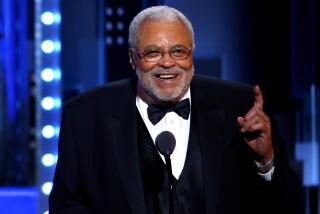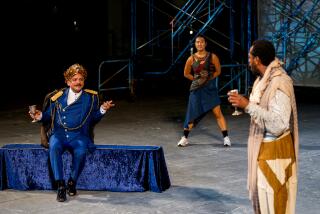From the Archives: Jack Lemmon, Everyman Star, Dies
Jack Lemmon, whose gift for broad physical comedy and soul-searching drama made him one of Hollywood’s most beloved and accomplished actors, has died. He was 76.
Lemmon died about 9 p.m. Wednesday at USC/Norris Cancer Center with his wife, actress Felicia Farr, two children and a stepdaughter at his bedside. The cause of death was complications from cancer, his longtime publicist Warren Cowan announced.
The two-time Academy Award winner, whose acting honors included two Emmy Awards, a Golden Globe and two Tony nominations, had been in failing health for some time.
------------
FOR THE RECORD
Friday’s obituary of actor Jack Lemmon gave an incorrect name for the nonprofit organization designated by his family for donations. It is the Natural Resources Defense Council.
------------
For many, Lemmon was best known for his films with longtime foil Walter Matthau, including “The Odd Couple,” “The Fortune Cookie” and “The Front Page.”
“He was a wonderful guy,” said legendary film director Billy Wilder, whose seven films with Lemmon included the classic “Some Like It Hot.”
“I loved him dearly,” Wilder said, “and he was the best actor I ever worked with.”
The impish son of a doughnut company executive, Lemmon first made his mark in comedy, starring in films by some of the masters of that genre. But during a career that spanned more than 50 films, Lemmon garnered as many Oscar nominations—eight—as Marlon Brando, considered by many the leading American actor of his generation.
And as one of the most versatile actors in motion pictures, the Broadway-trained Lemmon was the first actor to win Academy Awards for both best supporting actor, for the 1955 comedy “Mister Roberts,” and best actor, for the 1973 drama “Save the Tiger.”
“He was that rare combination of a true movie star in the old-fashioned sense and also a guy from Boston, your next-door neighbor,” said “On Golden Pond” author Ernest Thompson, who also wrote “A Sense of Humor,” in which Lemmon appeared at Los Angeles’ Ahmanson Theatre in the mid-1980s. “There wasn’t a lot of pretense,” Thompson said.
Added William Friedkin, who directed Lemmon in the 1997 television remake of “12 Angry Men”: “All I can tell you is that anyone who ever worked with Jack feels the same way. It has been a privilege to have had Jack in your life.”
For his part, Lemmon, though proud of his work, often gave much of the credit for his success to fate.
“My career has been full of remarkable coincidences that have nothing to do with me,” the characteristically humble actor said when he received the American Film Institute’s 16th Life Achievement Award in 1988.
From the opportunistic Ensign Pulver in “Mister Roberts,” to Tony Curtis’ sidekick in “Some Like It Hot,” to the baleful C.C. “Bud” Baxter in the romantic comedy “The Apartment,” Lemmon in just the span of 1955 to 1960 established himself as one of America’s top comic actors.
Indeed, the three roles earned him Academy Award nominations and he won an Oscar for “Mister Roberts.”
Comic Actor Turns to Drama
Over time, the Everyman qualities that guided him in comedies enabled Lemmon to deliver one searing dramatic performance after another.
In 1962, he and actress Lee Remick offered a devastating depiction of alcoholism as a couple whose addictions destroy their marriage in “Days of Wine and Roses,” for which he received an Oscar nomination.
A decade later, in “Save the Tiger,” Lemmon epitomized the confusion and disillusionment of the 1970s with his portrayal of Harry Stoner, a Los Angeles garment manufacturer in the throes of a breakdown.
And in many subsequent roles—the nuclear power plant official in “The China Syndrome,” the father searching in Chile for the truth about his son’s disappearance in “Missing,” both Oscar-nominated performances, the conniving real estate salesman in the movie of David Mamet’s Pulitzer Prize-winning drama, “Glengarry Glen Ross”—Lemmon played ordinary characters confronting extraordinary events.
“From his comic turns in ‘Mister Roberts’ and ‘Some Like It Hot’ to his flawed characters in ‘Save the Tiger’ and ‘Days of Wine and Roses’ to his suddenly politicized common men in ‘Missing’ and ‘The China Syndrome,’ Mr. Lemmon has sent one consistent message to his audiences, ‘This could be you,’ ” Samuel G. Freedman wrote years ago in the New York Times.
Or as Lemmon said in a 1980 interview, “I’ve never had to dodge that particular bullet of having to do [comedy or drama]. . . . I’ve been able to do both and sometimes both at once.”
George Stevens Jr., founder of the American Film Institute, said Thursday that “when you look at [Lemmon’s] career, there is a surprising diversity.”
On a set or on stage, the actor always seemed to treat his craft with a mix of workmanlike professionalism and awe.
Before he shot a scene, Stevens recalled, Lemmon would say, “It’s magic time.”
“He would say it very quietly,” Stevens said. “It was just a little tradition of his.”
Born two months prematurely on Feb. 8, 1925, in an elevator at Boston’s Newton-Wellesley Hospital, John Uhler Lemmon III was the only child of John Uhler Lemmon Jr., vice president of the Doughnut Corp. of America, and Mildred LaRue Noel Lemmon.
While he often credited his parents for his sense of comedy, Lemmon’s youth—though privileged—had its share of pain. As a child, he was frequently sick, and he underwent three serious ear surgeries before the age of 10.
As he reached adolescence, Lemmon pushed himself past illnesses through athletics, excelling as a distance runner—he broke the New England record for the two-mile run. As an adult, he remained physically active as an accomplished golfer and a fisherman who made yearly treks with his son to Alaska.
His parents’ troubled marriage also left its mark. “I had a happy childhood, but it was tempered with an acute awareness of the pain,” he said in one interview. Another time, he said: “The trouble is that, while my parents were great when they were apart, they were terrible together.”
Easing his troubles by performing, Lemmon developed comedy routines to entertain company and classmates.
“If I was [a natural comic], I didn’t know it,” he once said. “I remember trying to be funny and both of my parents were terribly funny. My father was also very dignified, but my mother was an absolute ding-a-ling, a ripper. Whenever I think of her, I think of her laughing.”
Lemmon first appeared on stage at the age of 4 with his father, an amateur soft-shoe dancer and singer in a barbershop quartet. After graduating from Philips Academy in Andover, Mass., Lemmon attended Harvard University, where, as a junior, he served as president of its Hasty Pudding theatrical club.
He left Harvard in 1945 to serve as a communications officer—an ensign—aboard the aircraft carrier Lake Champlain, and finished his studies after World War II ended.
After graduating in 1947, Lemmon went to New York City with great aspirations and a $300 loan from his father. But Broadway did not beckon, not immediately anyway, and Lemmon struggled to survive. An accomplished, self-taught pianist, Lemmon, among other jobs, performed in various bars.
“If I’d been bright,” he once said, “I’d have realized that I was horribly uncomfortable, amazingly frustrated, and like any sensible person, I’d have quit. But it never occurred to me that I wouldn’t be successful eventually.”
That success, on stage alone, would earn Lemmon Tony Award nominations in 1979 for “Tribute” and in 1986 for a revival of Eugene O’Neill’s “Long Day’s Journey Into Night.”
400 Appearances on TV in 5 Years
In 1948, Lemmon landed a role in a radio soap opera and soon thereafter began a five-year string of 400 appearances on a new medium: television.
It was during that period that Lemmon met and married his first wife, actress Cynthia Stone. The couple were married six years before divorcing and had one son, Christopher, who would become an actor and, Lemmon would later say, “In many ways . . . my best friend.”
Lemmon’s first film was director George Cukor’s “It Should Happen to You,” starring Judy Holliday.
“If it wasn’t for Judy,” Lemmon said, “I’m not sure I would have concentrated on films. I was a snot nose. . . . I would rather have sat around the old Walgreen’s drugstore in New York with all the other out-of-work actors, pooh-poohing guys in films.”
During that movie, Lemmon would often recall, the legendary director struggled to rein in the young actor’s performance. In early rehearsals, Lemmon remembered, Cukor would yell out, “Less, less, less” after Lemmon’s scene.
“Don’t you want me to act at all?” Lemmon asked.
“Dear boy,” Cukor replied, “you’re beginning to understand.”
In 1955, at age 29, Lemmon’s career began its meteoric ascent with his Oscar-winning performance in “Mister Roberts” opposite two screen giants--Henry Fonda and James Cagney.
Director John Ford first saw Lemmon in a farcical screen test set up by Lemmon’s longtime friend, director Richard Quine. (Quine would direct Lemmon in six of his own films, including “How to Murder Your Wife.”)
After spotting Lemmon, Ford immediately settled on the actor to play the role of the frenetic Navy ensign. Cornering him on a studio lot, the director implored Lemmon to immediately take the role and spit in his palm for a handshake to seal it. Lemmon, stunned, eventually took the role, though at that moment, he would say later, he had no idea that he had been talking to John Ford.
From there, Lemmon went on to a string of comedies and collaborations with some of Hollywood’s biggest talents.
In a 1996 interview, Lemmon said the legendary Wilder influenced his acting more than any other director.
Wilder also brought Lemmon and actress Shirley MacLaine together in film: first in “The Apartment” and later in “Irma la Douce.”
Lemmon appeared in several films—among them, “Days of Wine and Roses” and “The Great Race”--directed by another longtime friend, Blake Edwards.
And he gave several memorable performances in Neil Simon comedies, including “The-Out-of-Towners.”
But his best-known collaboration was with his close friend Matthau, with whom he made 10 films.
In their first film together, Wilder’s 1966 “The Fortune Cookie,” Lemmon was cast as a television cameraman injured during a football game and prodded by his conniving brother-in-law, Matthau, to fake injuries for a lawsuit.
Two years later, the two were paired in Neil Simon’s “The Odd Couple,” with Lemmon cast as the fastidious Felix Unger and Matthau as the slob sportswriter Oscar Madison.
Their comedic chemistry, as contentious cronies, delighted audiences in film after film, including Wilder’s 1974 remake of “The Front Page,” the 1993 hit “Grumpy Old Men” and the 1995 sequel “Grumpier Old Men.” Their last film together was “The Odd Couple II” in 1998.
Describing himself and Matthau as “very, very close” from their first film together, Lemmon said in a 1996 interview that their friendship made movie roles easy.
“The working relationship was heaven because we were always on the same wavelength and we never got off it,” Lemmon said. “So, it’s just sort of like sitting down and chatting with each other when we rehearse—there’s nothing to it. We just run the lines a couple of times and say, ‘Let’s go.’ ”
Lemmon was devastated when Matthau died last July 1 at age 79. “I have lost someone I loved as a brother, as a closest friend and a remarkable human being,” Lemmon said. “We have also lost one of the best damn actors we’ll ever see.”
Love of Acting Never Faded
Through hits and disappointments, Lemmon’s love of craft—and sense of self—never dimmed.
In 1984, Charles Champlin, then the Times arts editor, wrote that Lemmon, despite two Oscars and as many decades of acclaim, had hardly changed from the days he first arrived in Hollywood.
“He still has the excitement, spontaneity, idealism and vulnerability of the new boy in town,” Champlin wrote. “He rejects roles that seem merely profitable and, unlike some of his starry contemporaries, accepts projects that offer little if any financial reward, simply because he feels passionately about the importance of the material.”
“Save the Tiger” was but one example. Lemmon felt so strongly about playing businessman Harry Stoner, a turning-point role after a series of comedies, that the actor agreed to work for scale—$165 a week—because studio executives refused to pay more than $1 million to make the film. That same movie today, he estimated, would cost $40 million.
The film role was so demanding, Lemmon would later say, that he, like the character, teetered on the edge of a breakdown. “I started to crack as the character did,” he said. “I just kept getting deeper and deeper into the character’s despair.”
Because of his association with the character, or perhaps in spite of it, the actor delivered a performance that many rank as his best.
A popular figure in Hollywood, Lemmon was as well regarded for his humanity as for his acting. “In a town where reputations are served up shredded with your salad,” columnist Roderick Mann wrote in 1980, “hardly anyone has a bad word to say about Jack Lemmon.”
That’s not to say that Lemmon was a colorless goody-goody.
He was well-known for enjoying his martinis, though he always insisted that the stories about his drinking were exaggerated. He gave up drinking, as well as smoking, at age 60.
He was unabashedly passionate about certain causes, such as the environment and animal rights, and was never one to shy away from controversial films or blunt language.
“This is the only country where you can do a film like I did and then end up in the [bleeping] White House,” Lemmon said after a 1982 visit with then-President Ronald Reagan following the release of “Missing.” The film, based on a book about the disappearance and death of an American journalist during Chile’s 1973 military coup, sharply criticized U.S. foreign policy.
In 1983, Lemmon helped pay to fly the body of a 21-year-old San Diegan back to the United States for an autopsy that showed that the youth suffered “blunt force” bruises before being shot by Salvadoran troops.
A Devoted Fan of Golf
Those who knew Lemmon for years recalled his love of golf.
“His great aim was to make the cut at the AT&T Pro-Am tournament in Pebble Beach, and he almost did about four years ago,” said publicist Cowan. “But then on the last day, it rained and he didn’t make it.”
Longtime friends also remembered Lemmon’s devotion to his family’s black standard poodle, Chloe.
“His dog used to come on the set,” said director Friedkin. “She would watch takes and if she saw too much of it, she would amble back to Jack’s dressing room on her own. That was one of the endearing things about Jack.”
With no thought of retirement, Lemmon’s acting—and the accolades—continued throughout his life.
In 1999, three years after receiving Kennedy Center Honors, Lemmon received two Golden Globe nominations, appeared in a Showtime remake of “Inherit the Wind” and won an Emmy for his performance as an inspiring teacher stricken with Lou Gehrig’s disease in the television film “Tuesdays With Morrie.”
“I loved him,” said actor Peter Gallagher, who worked several times with Lemmon and played his son in the Broadway production of “Long Day’s Journey Into Night.”
“What I learned from him is that people who are really at the top are at the top for a reason,” Gallagher said.
Though first and foremost an actor, Lemmon took a turn or two behind the camera. He co-produced the classic “Cool Hand Luke,” starring Paul Newman, directed the 1971 film “Kotch,” which won Matthau an Oscar nomination, and composed a song for the 1957 film “Fire Down Below,” in which he starred.
Lemmon married Farr in 1962. She survives him, as does their daughter, Courtney; his son, Christopher; stepdaughter Denise; and three grandchildren.
In lieu of flowers, his family requests that donations be made to the National Resources Defense Council, a New York-based nonprofit organization.
Times staff writers Susan King, Thomas Bonk and Suzanne Muchnic and Times librarian John Tyrrell contributed to this story.
More to Read
Start your day right
Sign up for Essential California for the L.A. Times biggest news, features and recommendations in your inbox six days a week.
You may occasionally receive promotional content from the Los Angeles Times.







